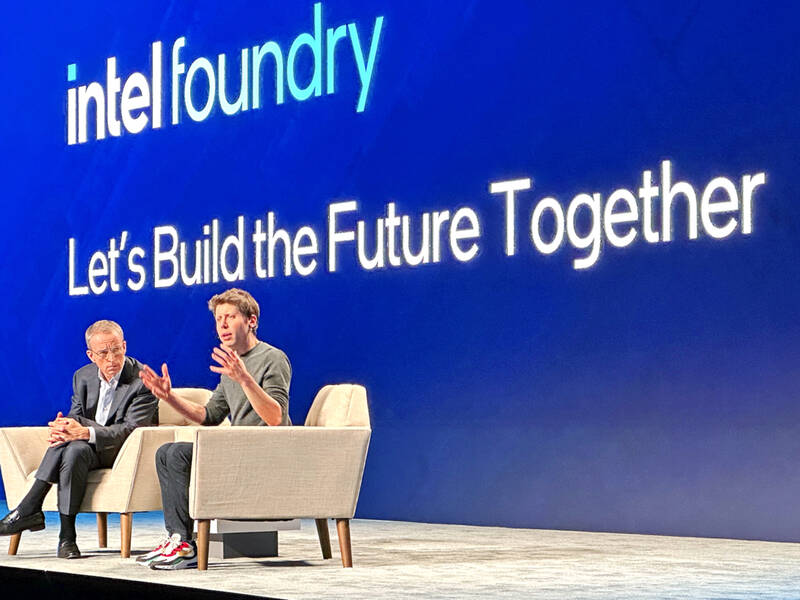Intel Corp has landed Microsoft Corp as a customer for its made-to-order chip business, marking a key win for an ambitious turnaround effort under chief executive officer Pat Gelsinger.
Microsoft plans to use Intel’s 18A manufacturing technology to make a forthcoming chip that the software maker designed in-house, the two companies said at an event on Wednesday.
They did not identify the product, but Microsoft recently announced plans for two homegrown chips — a computer processor and an artificial intelligence (AI) accelerator.

Photo: AP
Intel has been seeking to prove it can compete in the foundry market, where companies produce custom chips for clients. It is a major shift for the semiconductor pioneer, which once had the world’s most advanced chipmaking facilities and kept them to itself. These days, Intel is racing to catch up with companies such as Taiwan Semiconductor Manufacturing Co (台積電), which leads the foundry industry.
Meanwhile, Microsoft is looking to secure a steady supply of semiconductors to power its data-center operations — especially as demand for AI grows. Designing its own chips also lets Microsoft fine-tune the products to its specific needs.
“We need a reliable supply of the most advanced, high-performance and high-quality semiconductors,” Microsoft chief executive officers Satya Nadella said in a statement. “That’s why we are so excited to work with Intel.”
The broader industry has struggled to get enough advanced silicon — particularly Nvidia Corp’s highly prized accelerator chips, which help develop chatbots and other AI services.
For Intel, securing a large customer for its foundry business should help reassure investors that Gelsinger’s comeback bid remains on track. His plan involves building out the chipmaker’s factory operations to handle the increased load — a costly gamble — as well as restoring Intel’s once-dominant technological prowess.
The company is looking to governments in the US and Europe to help defray the costs, and seeing Microsoft on board might help that effort.
Intel has held talks with the administration of US President Joe Biden to secure more than US$10 billion in subsidies under the Chips and Science Act, Bloomberg reported last week.
Microsoft and cloud-computing rivals Amazon.com Inc and Alphabet Inc’s Google are among the largest buyers of advanced chips, which they use to power their data centers. They have increasingly turned toward using their own designs — a trend that’s hurt Intel in its most lucrative business. Acting as a foundry for Microsoft and others could help grab back at least a portion of that lost revenue.

TECH BOOST: New TSMC wafer fabs in Arizona are to dramatically improve US advanced chip production, a report by market research firm TrendForce said With Taiwan Semiconductor Manufacturing Co (TSMC, 台積電) pouring large funds into Arizona, the US is expected to see an improvement in its status to become the second-largest maker of advanced semiconductors in 2027, Taipei-based market researcher TrendForce Corp (集邦科技) said in a report last week. TrendForce estimates the US would account for a 21 percent share in the global advanced integrated circuit (IC) production market by 2027, sharply up from the current 9 percent, as TSMC is investing US$65 billion to build three wafer fabs in Arizona, the report said. TrendForce defined the advanced chipmaking processes as the 7-nanometer process or more

Who would not want a social media audience that grows without new content? During the three years she paused production of her short do-it-yourself (DIY) farmer’s lifestyle videos, Chinese vlogger Li Ziqi (李子柒), 34, has seen her YouTube subscribers increase to 20.2 million from about 14 million. While YouTube is banned in China, her fan base there — although not the size of YouTube’s MrBeast, who has 330 million subscribers — is close to 100 million across the country’s social media platforms Douyin (抖音), Sina Weibo (新浪微博) and Xiaohongshu (小紅書). When Li finally released new videos last week — ending what has

OPEN SCIENCE: International collaboration on math and science will persevere even if the incoming Trump administration imposes strict controls, Nvidia’s CEO said Nvidia Corp CEO Jensen Huang (黃仁勳) said on Saturday that global cooperation in technology would continue even if the incoming US administration imposes stricter export controls on advanced computing products. US president-elect Donald Trump, in his first term in office, imposed restrictions on the sale of US technology to China citing national security — a policy continued under US President Joe Biden. The curbs forced Nvidia, the world’s leading maker of chips used for artificial intelligence (AI) applications, to change its product lineup in China. The US chipmaking giant last week reported record-high quarterly revenue on the back of strong AI chip

Qualcomm Inc’s interest in pursuing an acquisition of Intel Corp has cooled, people familiar with the matter said, upending what would have likely been one of the largest technology deals of all time. The complexities associated with acquiring all of Intel has made a deal less attractive to Qualcomm, said some of the people, asking not to be identified discussing confidential matters. It is always possible Qualcomm looks at pieces of Intel instead or rekindles its interest later, they added. Representatives for Qualcomm and Intel declined to comment. Qualcomm made a preliminary approach to Intel on a possible takeover, Bloomberg News and other media